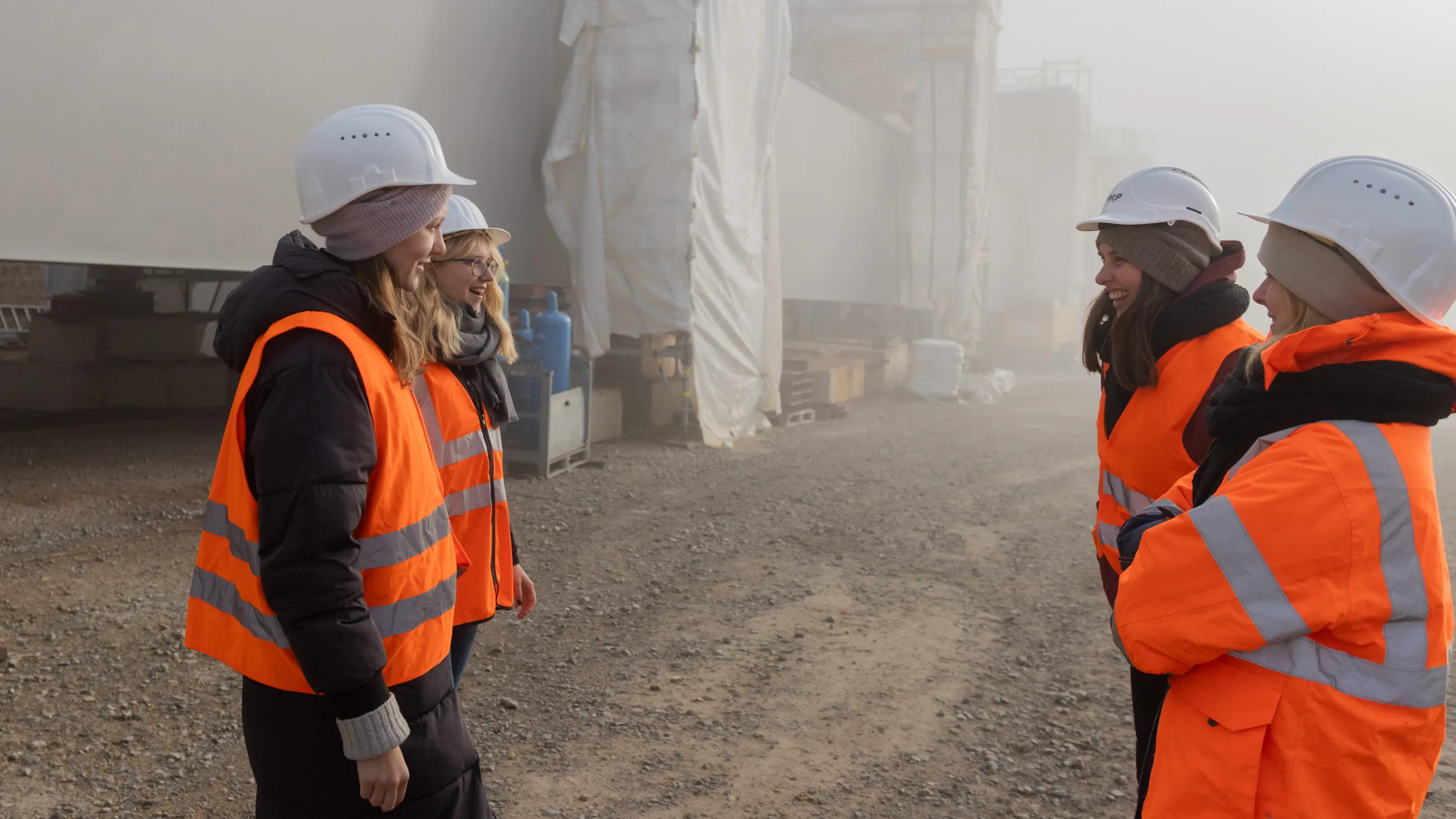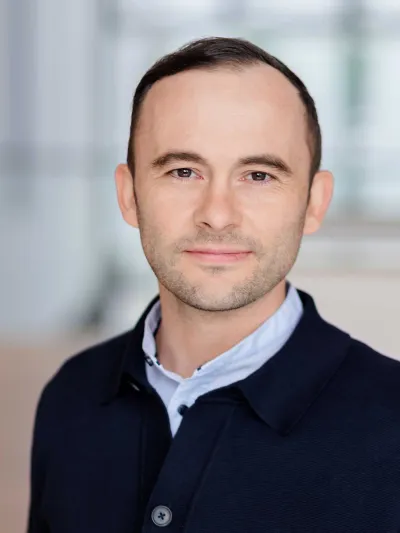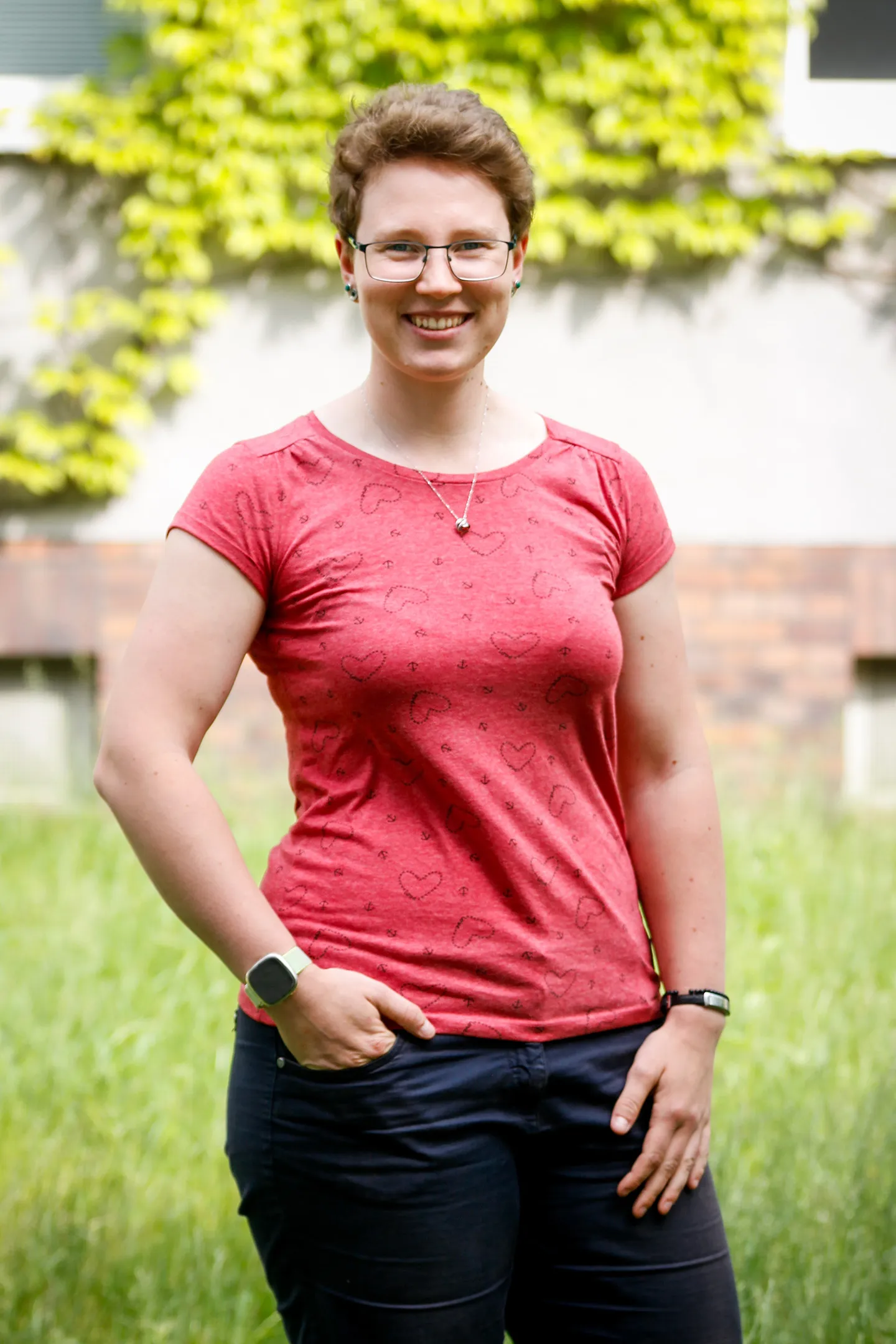The infrastructure systems degree programme is about the planning, construction and operation of technical infrastructure facilities. This includes the transport networks with their roads as well as railways and waterways as well as the private and public transport moving on them, which ensures our mobility. The systems for energy and water supply as well as wastewater disposal are also part of it. The design of technical infrastructure is a subarea of civil engineering.
7 semesters, incl. one practical semester
15/05 – 15/07 (restricted admission)
210 ECTS credits
Profile
Resource-efficient infrastructure systems for progressive cities and regions
In order for infrastructure systems to function well in the long term and also in their interrelationships with each other, questions of urban development and spatial planning are basic principles of planning. Today, geodata are increasingly included and digital planning models and tools are used.
One focus is on the design of transport infrastructure facilities. The design initially deals with the routing of roads and railways, whereby traffic junctions are of particular importance for traffic control. Traffic control facilities, such as traffic signals, are assigned to traffic engineering. For the operation of public transport systems, the creation of timetables is a central task. The networking of transport systems and the integration of digital technologies in the sense of a smart city are becoming increasingly important.
The construction and maintenance of roads and railways involves the type of construction, the selection and processing of building materials and construction methods, as well as analysis methods for assessing damage.
The design of supply and disposal infrastructure facilities is another focus. Urban water management is concerned with the conservation and use of natural water resources for the supply of water and in the disposal of wastewater. The fields of activity of infrastructure systems specialists are closely linked to energy and environmental issues.
Is this degree programme right for me?
You bring these qualities with you
- Interest in structures and construction processes as well as in the topics of transport and mobility, energy and water
- Good mathematical and physical understanding
- IT affinity and an openness to digital solutions
- Good communication skills as well as solution-oriented and independent thinking
- Problem-solving skills
- Ability to work in a team and independently

Information day 2025: We are opening our doors
Open Day at the University of Applied Sciences Potsdam: On the 24th of May 2025, you will get to know the diverse study programmes at our university, explore the campus and gain exclusive insights into our modern laboratories and workshops.
Take the opportunity to talk to students and lecturers in person and look forward to a varied programme.
Course flyer
- Flyer Studiengang Infrastruktursysteme (B. Eng.) (PDF, 297.72 KB)
Contact
The colleagues at the student counselling service provide information to prospective students, first-year students, parents, teachers and students on all general questions about studying. If you have specific questions or concerns about the bachelor's degree programme in infrastructure systems, please contact the subject counselling service.
Subject Counseeling Service
These degree programmes might also interest you
More courses| Department | Degree programme | Teaching language | Start of study | Application deadline |
|---|---|---|---|---|
| |
Civil Engineering (BEng) | German | Winter semester | 15/05 – 15/07 (restricted admission) |
| |
Civil Engineering | Dual (BEng) | German | Winter semester | 15/06 – 15/07 (free of admission) |
| |
Infrastructure Systems (BEng) | German | Winter semester | 15/05 – 15/07 (restricted admission) |
| |
Infrastructure Systems | Dual (BEng) | German | Winter semester | 15/06 – 15/07 (free of admission) |
| |
Ing•Bau: Preservation and Construction Work in Structural Engineering (MSc) | German | Summer semester, Winter semester | 15/12 – 15/02 and 15/05 – 15/07 (restricted admission) |
| |
MEng Building Conservation and Construction Work on Existing Buildings | German | Summer semester | 15.12. – 15.02. (admission restricted) |
| |
Urban Water Management | Dual (BEng) | German | Winter semester | 15/06 – 15/07 (free of admission) |
Career Prospects
Career prospects
Graduates of the bachelor's degree programme infrastructure systems are sought-after professionals with prospects both in traditional institutions of the construction and infrastructure sector, as well as in innovation industries or start-ups.
Possible areas of application
- Transport services
- Public utilities
- Planning departments
- Construction management
- Water boards
- Public administrations
- Consulting companies
- Information technology companies
Prepared for the world of work
The infrastructure systems degree programme prepares you to competently manage the following situations:
- You will accompany the new construction of facilities in urban water management as well as construction measures on existing facilities from the first sketch to completion, e.g. the construction of a sewage treatment plant, the conversion and modernisation of a waterworks or the renovation of a sewer network.
- To do this, they design, construct and calculate the individual parts of the plants from the pipe to the digestion tower. They decide on the construction method, select the construction elements and the suitable materials and technologies.
- They ensure that the plants comply with both legal and technical requirements. For example, they accompany the approval procedure and ensure compliance with the current requirements for the purification performance of the waterworks.
- They plan and control the execution of construction projects in the office and on the construction site. In dialogue with architects, specialist planners, building owners and the companies carrying out the work, they ensure the completion of the construction project with regard to time, costs and quality.
- They operate the water supply and sanitation systems and ensure that drinking water flows out of the tap at all times and that wastewater is treated in accordance with the state of the art so that water bodies are not polluted.
- They work on technical problems independently and systematically in teams and individually on the basis of scientific working methods. In doing so, they apply their knowledge and skills, e.g. in the use of specialised software for the planning and dimensioning of facilities as well as geoinformation software for the computer-based networking of all information on the inventory of facilities, and expand their knowledge as required. They support decision-making processes, e.g. through reports and presentations.
- In addition to the classic range of activities, they can also work for manufacturers of construction products and plant technology (Germany is the world leader in plant technology for urban water management), in sales and in advisory and expert activities.
These degree programmes might also interest you
More courses| Department | Degree programme | Teaching language | Start of study | Application deadline |
|---|---|---|---|---|
| |
Civil Engineering (BEng) | German | Winter semester | 15/05 – 15/07 (restricted admission) |
| |
Civil Engineering | Dual (BEng) | German | Winter semester | 15/06 – 15/07 (free of admission) |
| |
Infrastructure Systems (BEng) | German | Winter semester | 15/05 – 15/07 (restricted admission) |
| |
Infrastructure Systems | Dual (BEng) | German | Winter semester | 15/06 – 15/07 (free of admission) |
| |
Ing•Bau: Preservation and Construction Work in Structural Engineering (MSc) | German | Summer semester, Winter semester | 15/12 – 15/02 and 15/05 – 15/07 (restricted admission) |
| |
MEng Building Conservation and Construction Work on Existing Buildings | German | Summer semester | 15.12. – 15.02. (admission restricted) |
| |
Urban Water Management | Dual (BEng) | German | Winter semester | 15/06 – 15/07 (free of admission) |
Study Content
Course of studies
The standard period of study for the full-time degree programme in infrastructure systemsis seven semesters and concludes with a bachelor of engineering degree.
|
Semester 1 – 2 |
Compulsory modules, basic studies: structural engineering, infrastructure systems, urban water management |
| Semester 3 – 4 | Compulsory modules, basic studies: Structural engineering, infrastructure systems, urban water management |
| Semester 5 | Practical semester |
| Semester 6 – 7 |
Compulsory modules, in-depth studies, elective modules, |
Study content
In the currently valid module handbooks, study and examination regulations and statutes of the civil engineering department, you will find the module overview, a detailed description of the modules and study contents, the study plan as well as the statutes for the implementation of the selection procedure for the study programme Infrastructure Systems.
Teaching formats
The theory semesters in the infrastructure systems degree programme guarantee a theoretically sound and equally practical study through the choice of teaching formats:
- Lectures
- Seminars
- (Laboratory) exercises
- Projects
- Excursions
- Tutorials
Modules
During the first two semesters, mainly technical and scientific basics of civil engineering are taught, while in the following semesters modules of hydraulic engineering are increasingly integrated. In the sixth and seventh semesters, the specialised knowledge for infrastructure systems is deepened and an individual focus is set through elective modules.
The content of the bachelor's degree programme in infrastructure systems consists of general principles of civil engineering, construction fundamentals, teaching content of infrastructure and urban water management as well as construction management and law.
- Mathematics, technical drawing, surveying, communication and scientific work, reflection on theory-practice transfer and course of studies.
- Structural analysis, building construction, building materials, building physics, foundation engineering, solid construction
- Urban construction, mobility systems, design of traffic routes, traffic engineering, hydraulic engineering, water & waste water, environmental and planning law
- Project management, construction operations, construction planning, construction law, construction business management
Practical semester
In order to support the transfer between theory and practice, an internship semester is integrated into the infrastructure systems degree programme, which is supervised by the University of Applied Sciences Potsdam. It can also be used for a stay abroad or participation in a research project.
For detailed information, please refer to the internship regulations on the study organisation page.
Application & Contact
Dates & requirements for your application
The most important deadlines, dates and admission requirements for the bachelor's degree programme infrastructure systems are compiled here. You can find out which steps you need to take for a successful application in the next section.
Dates
- 24th of May 2025: Open Day at the FH Potsdam
- by the 15th of July: register and submit an online application
- by the 15th of July: apply for a higher semester to continue a degree programme you have started at the University of Applied Sciences Potsdam
Access requirements
- General university entrance qualification according to the Brandenburg university act: General university entrance qualification or entrance qualification for studies at universities of applied sciences or previous vocational training recognised as equivalent
This is how you apply!
In the following, we explain to you which aspects you should pay attention to from the registration for the central allocation of study places to the matriculation (enrolment).
Further information
The following links provide you, and especially international applicants, with further information on the topics of application and enrolment at the University of Applied Sciences Potsdam.
International applicants
You would like to apply for studies from the first or a higher semester and have acquired your school-leaving qualification and/or university degree abroad? Then you can have degrees and achievements acquired abroad recognised and study with us.
Application & Enrolment Procedure
The application and study service provides information and advice on general questions regarding the application process, admission and enrolment at the University of Applied Sciences Potsdam, application for a higher semester, but also on topics such as compensation for disadvantages, part-time studies, waiting semesters and hardship applications.
Contact & Services
The student counselling service provides information and advice on general questions about studying as well as on topics such as choosing a degree programme, application, enrolment and study organisation.
For subject-specific questions on module contents, credit transfer, examinations or specialisations in the study programme infrastructure systems, the subject counselling service is the right place to go.
Subject Counselling Service
Study and Examination Service
Study Info Service
studien-info-service@fh-potsdam.de
bewerbungs-service@fh-potsdam.de
campuskarte@fh-potsdam.de
Study Service
studien-service@fh-potsdam.de
Exam Service
pruefungs-service@fh-potsdam.de
Family Affairs Commissioner
Office hours
Tue and Thu 9.30 am – 1.30 pm
Commissioner for University Employees with Impairment
Office hours
by arrangement







